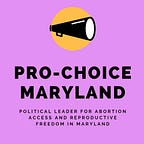Environmental Justice is Reproductive Justice
by Maggie Marsh
Reproductive justice is intrinsically linked to environmental justice because the effects of climate change and environmental pollution limit pregnant people’s freedom to choose if and when to become pregnant and their rights to be pregnant and raise families in a safe and healthy environment. Low-income communities, communities of color, and immigrants are most adversely impacted by irresponsible and harmful environmental policies and often reside in areas which are more vulnerable to the effects of climate change. Reproductive justice demands that people’s ability to parent and their decisions about their bodies and reproduction not be impeded by the inequitable distribution of environmental hazards.
Low-income communities and communities of color are disproportionately exposed to various hazardous chemicals in air, water, and soil including metals, phthalates, and pesticides. Research has shown that exposure to certain chemicals before or during pregnancy can adversely impact reproductive health and cause a range of issues including infertility, pre-term birth, low-birth weight, miscarriages, birth defects and disabilities, reproductive cancers, endometriosis, and PCOS. Additionally, exposure to certain toxic chemicals in both fetuses and young children can also cause developmental delays and long-term health issues.
The pollution associated with various types of adverse reproductive health and pregnancy outcomes also contributes to climate change and rising global temperatures. Pregnant people are especially vulnerable to extreme heat, and they are at increased risk of heat stroke and pregnancy complications as a result of rising global temperatures. Exposure to unusually hot temperatures can lead to changes in length of gestation, low birth weight, increased stillbirth rates, and neonatal stress. Further, climate change causes increased instances of natural disasters which can have specific adverse impacts on pregnancy outcomes, reproductive freedom, and the psychological health of pregnant people. Researchers found that after Hurricane Katrina, pregnant people who experienced the trauma of a natural disaster had higher rates of low birth weight and preterm deliveries. Additionally, natural disasters can cause an interruption in reproductive health care services which can lead to a lack of access to contraception, abortion care, and menstrual hygiene products. Inaccessible reproductive health care services can result in unplanned pregnancies and reduced reproductive freedom; conversely natural disasters can reduce fertility as families delay childbearing due to displacement, housing instability, and poor medical care availability. Furthermore, natural disasters can put people at increased risk of sexual assault and intimate partner violence.
Environmental disparities remain a significant issue in Maryland, and with climate change having a more devastating impact with each passing year, it is critical we push legislators to implement policies which achieve environmental justice. Some environmental justice issues in Maryland include water pollution contaminating fish which disproportionately impacts low-income farmers, lack of access to green spaces in urban environments which contribute to the heat island effect, failure to remediate environmental harms in low-income communities and communities of color, improper waste management in many communities in Baltimore City, siting of landfills and toxic emissions facilities in low-income areas, disparities in the enforcement of pollution control laws violations, and inadequate and unsafe housing.
Because of the heightened awareness and advocacy of those knowledgeable about the intersection of environment and health rights, the Maryland General Assembly (MGA) made strides with environmental legislation in 2021 with an increased number of bills introduced, with some passing into law.
One example of successfully passed legislation is HB1207 (SB0674), which increases the capacity of the Commission on Environmental Justice and Sustainable Communities, and alters Commission membership to better reflect communities most impacted by environmental hazards. This is a step in the right direction to center justice in environmental policy legislation, but more action is needed to implement proactive solutions which center communities historically impacted by environmental and reproductive injustice.
HB0051 (SB0121) was proposed this year and failed, but would have required property owners to do an environmental justice analysis before constructing or operating a landfill. Although this bill did not pass, it is critical that legislators consider that landfills and waste management facilities are disproportionately located in low-income and Black and Brown communities, and there are serious adverse health implications associated with residence near landfills. Exposure to pollution from landfills during pregnancy can lead to miscarriages, preterm birth, low birth weight, and birth defects.
MGA also passed HB1069, which requires owners of residential rental properties served by private well water to test water quality and disclose results to tenants and the local health department. This is an important bill for reproductive justice because nitrates, a common toxicant found in well water, can cause infant methemoglobinemia which can be a life-threatening condition. Additionally, exposure to nitrates can lead to poorer birth outcomes for pregnant people.
Other successful legislation included HB0076 (SB0334), which gives individuals impacted by water and soil pollution the right to seek justice in civil court. It is critical that individuals and communities impacted by environmental injustice have this right because exposures to certain pollutants can have life-long and sometimes intergenerational impacts on reproductive health and development.
Another bill of interest is HB0643, which prohibits certain chemicals from cosmetic products. This is important legislation which catches up to the scientific consensus that chemical exposure can be detrimental to health, especially for pregnant people.
HB0204 (SB0324) passed which allows complaints on environmental violations to be collected and processed to track trends and identify opportunities for policy reform and litigation. This is a critical step to mitigate disparities in enforcement of pollution control laws violations, but close attention is needed to ensure environmental violations are remediated equitably.
Lastly, HB0583 (SB0414), the Climate Solutions Now Act, was proposed and failed this year. It aimed to achieve net-zero state greenhouse gas emissions by 2045 with specific environmental justice considerations. Because of the inequitable distribution of environmental burdens, it is critical that environmental legislation be written and implemented through a justice-centered lens. Further, policy makers must consider the reproductive health, freedom, and justice implications of climate change and environmental hazards in order to determine equitable solutions.
